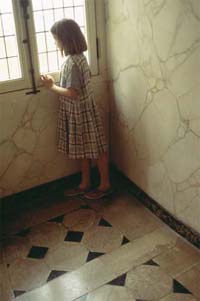Archived Content
The National Institute of Mental Health archives materials that are over 4 years old and no longer being updated. The content on this page is provided for historical reference purposes only and may not reflect current knowledge or information.
Child Abuse Survivors Have Higher Risk for STDs in Adulthood Than Non-abused Adults
• Science Update

A history of child abuse or neglect can increase the risk for STDs in adulthood, according to a study partly funded by NIMH. The researchers reported their findings in the April 2009 supplemental issue of the American Journal of Public Health.
Background
Helen W. Wilson, Ph.D., Rosalind Franklin University of Medicine and Science, and Cathy S. Widom, Ph.D., John Jay College of the City University of New York, built on their previous work tracking adults who experienced physical or sexual abuse or neglect before age 11.
Based on information obtained from a series of interviews and assessments completed over time, the researchers examined the prevalence of sexually transmitted diseases (STDs) in 754 participants, 328 of whom served as non-abused or neglected controls, with an average age 41. The researchers also received significant funding from the Eunice Kennedy Shriver National Institute of Child Health and Human Development (NICHD).
Results of the Study
The researchers found that people who had experienced abuse or neglect 30 years prior to the study were more likely than controls to have had an STD. In some cases, abuse survivors were three times as likely to have had more than one type of STD. Childhood sexual abuse appeared to increase risk for STDs in women but not in men. Any kind of childhood abuse increased overall risk for STDs among white participants, but not black.
Significance
This study was the first to show an increased risk of STDs in childhood abuse or neglect survivors tracked over time. The findings emphasize the importance of having supportive family relationships during childhood, and also suggest that screening and early intervention may help diagnose or even prevent STDs in child abuse survivors.
What's Next
According to the researchers, further study is needed to explore the underlying mechanisms of how childhood maltreatment affects a person's risk for STDs. Understanding the early life experiences and factors that can influence adult health may lead to better methods of screening, identifying, or preventing certain illnesses.
References
Wilson HW, Widom CS. Sexually Transmitted Diseases Among Adults Who Had Been Abused and Neglected as Children: A 30-Year Prospective Study . Am J Public Health. 2009 Apr;99 Suppl 1:S197-203. PMID: 19218173
